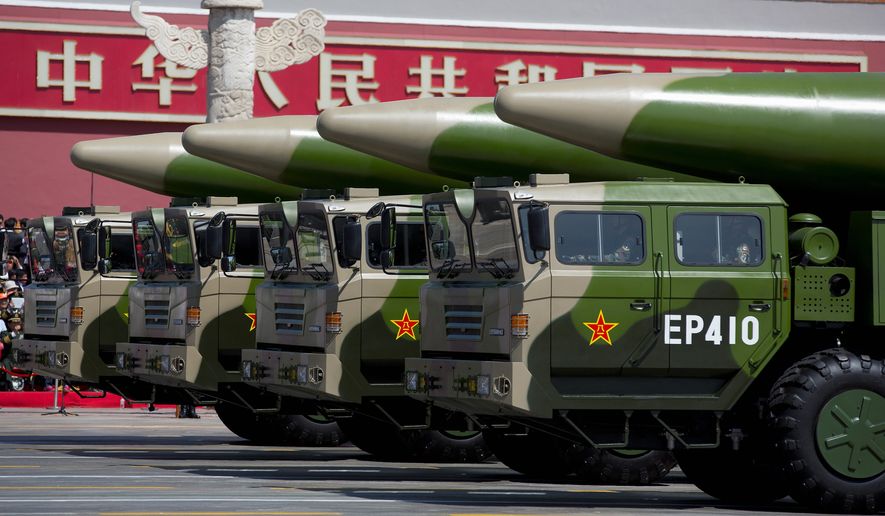Senior Republicans on the House and Senate Armed Services committees disclosed last week that China’s rapidly expanding nuclear forces now exceed the number of U.S. intercontinental-ballistic missile launchers, with little indication that Beijing plans to slow the buildup of its strategic forces.
“The head of U.S. Strategic Command has informed us that China has surpassed the U.S. in the number of ICBM launchers — this should serve as a wake-up call for the United States,” said House Armed Services Committee Chairman Mike Rogers of Alabama and Rep. Doug Lamborn of Colorado, chairman of that panel’s strategic forces subcommittee.
The joint statement also was issued along with Mississippi Sen. Roger Wicker, ranking Republican on the Senate Armed Services Committee, and Nebraska Sen. Deb Fischer, ranking Republican member of the strategic forces subcommittee.
“It is not an understatement to say that the Chinese nuclear modernization program is advancing faster than most believed possible,” the four lawmakers said. “We have no time to waste in adjusting our nuclear force posture to deter both Russia and China. This will have to mean higher numbers and new capabilities.”
Air Force Gen. Anthony Cotton, commander of the Strategic Command, stated in a Jan. 23 letter to the four lawmakers that as of October 2022, “the number of land-based fixed and mobile ICBM launchers in China exceeds the number of ICBM launchers in the United States.”
The notification followed a back-and-forth exchange between Republican lawmakers and the Strategic Command regarding a provision of the fiscal 2022 defense authorization law requiring formal notification of Congress when China’s nuclear forces exceed those of the United States in one of three designated areas.
While exceeding the U.S. in the number of ICBM launchers, China’s nuclear forces overall remain smaller than those of the United States in the number of active long-range missiles and in the number of missile warheads, Gen. Cotton said.
Strategic Command officials first notified the Armed Services panels in a secret response on Nov. 8 that China had had breached one of three categories of nuclear missile expansion, but declined to specify which category. Gen. Cotton said the command is committed to working with the intelligence community and the Biden administration to maximize the amount of information that could be shared about China’s nuclear programs.
No further details were provided on the Chinese ICBM launchers in the unclassified version.
Last year, however, then-Strategic Command commander Adm. Charles Richard declared China in “nuclear breakout,” what he termed a rapid buildup of missiles, bombers and submarines that requires an immediate response from the Pentagon to preserve deterrence. The Pentagon so far has not indicated whether it is speeding up its nuclear modernization plan to deploy replacement missiles, bombers and submarines, now scheduled for later in the decade.
China’s large number of ICBM launchers is believed to be the result of deployment of new DF-31 and DF-41 multi-warhead missile launchers.
U.S. intelligence agencies recently discovered three large missile fields under construction in western China that the Strategic Command has said will hold up to 320 land-based ICBMs.
In addition to the missile silos, China also has large numbers of both road-mobile and rail-mobile ICBM launchers that likely are factored into the recent notification.
The U.S. military has no mobile missiles, and efforts to develop them were thwarted in the past by anti-nuclear weapons activists in Congress.
The current land-based U.S. missile force consists of 400 single-warhead Minuteman III ICBMs deployed at three bases in the western United States.
The recent Chinese surveillance balloon that transited the United States before being shot down over the Atlantic passed over Malmstrom Air Force Base, Montana, where 150 Minuteman III ICBMs are deployed.
The Biden administration has stated in its national security strategy that it seeks to reduce the role of nuclear weapons and will seek arms control as a main element of its polices.
But arms control efforts have so far been unsuccessful. China for the past several years refused to engage in arms talks with the United States. The State Department recently announced Russia is violating the last major arms treaty, the New START accord, by not allowing mandatory on-site inspections called for in the treaty.
• Bill Gertz can be reached at bgertz@washingtontimes.com.




Please read our comment policy before commenting.